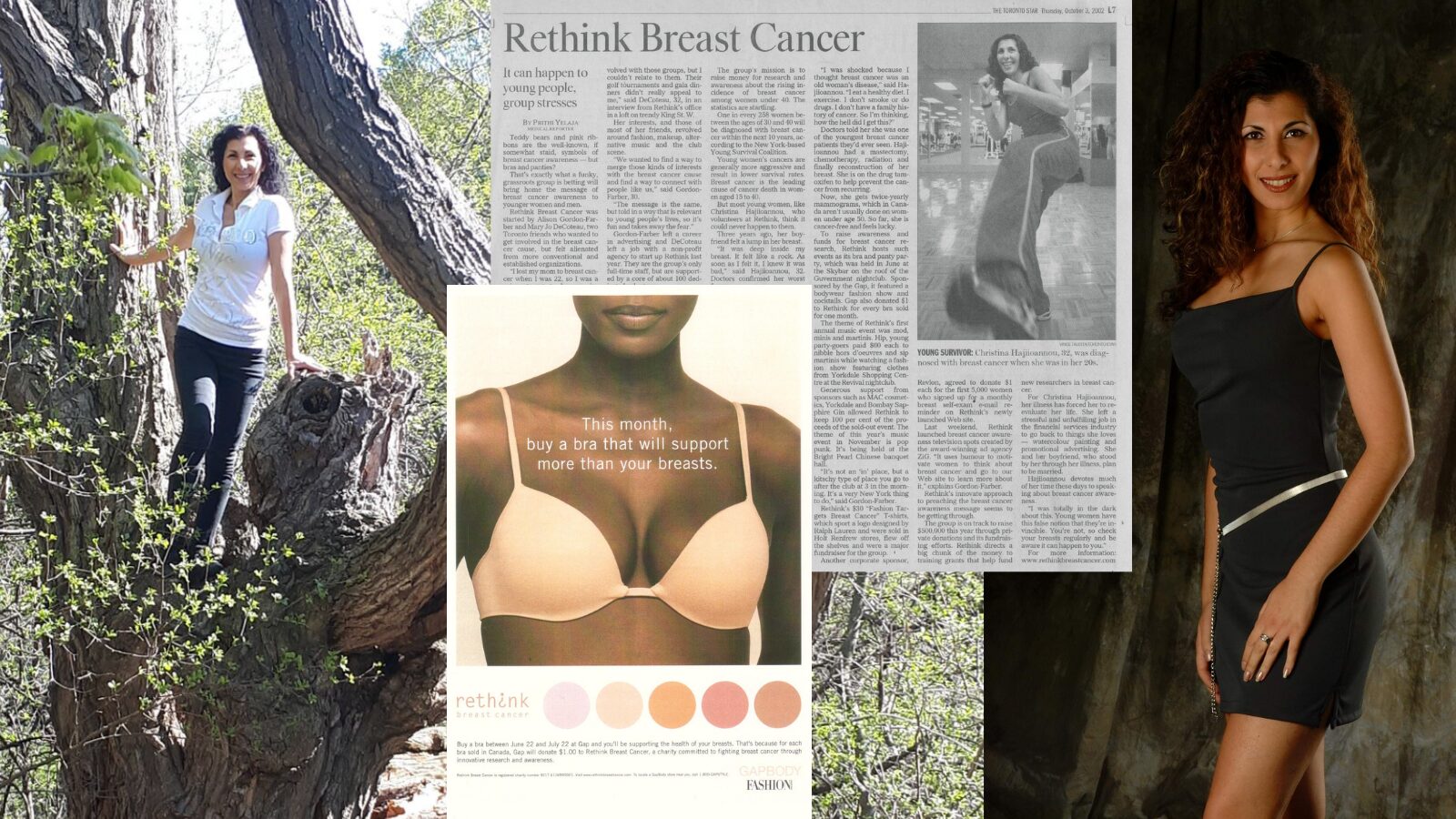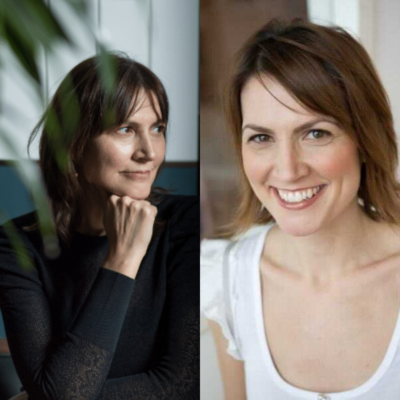20 Years of Rethink: Christina’s Impact
8 MINS to read

I still remember our initial meeting with the very first young woman with breast cancer that walked through our doors nineteen years ago. While my own mom was still a young breast cancer patient, having been diagnosed at 48 years old, Christina Hajiioannou was my age. I had never met anyone diagnosed in their 20s and Christina was 28 when her then boyfriend found a lump.
We met her 19 years ago during our second year building a charity to engage young people who were in the dark about their risks and breast health. Having brought a global campaign, Fashion Targets Breast Cancer, to Canada our first year raised, we’d raised over $250,000. Some of the funds went to breast health education and it felt good to give those informative but drab breast cancer pamphlets a make-over to make them relevant for younger women. But we wanted the funds we had raised to go to more than strictly awareness and education, so we funded innovative breast cancer research too. The focus of our research program was to provide seed-funding for high-impact projects led by new and upcoming researchers. I loved that we were engaging young people in accessible fundraising events and then turning around and allocating the funds to the next generation of brilliant young breast cancer researchers.
Fashion Targets had not just raised significant funds for us, the buzz from it helped open other doors. By Spring 2002, we had a national partnership with GAP Canada who was launching their first bodywear line. They would donate proceeds from their bra, and we convinced them we could throw “bra and panty parties” in their key markets across the country. We were a team of two official staff (me and Alison Gordon) and a crew of dedicated volunteers, operating out of a tiny office generously donated by the ad agency ZiG. We had barely left the meeting with GAP and I was on the phone with family and friends in Calgary and Vancouver convincing them that they could throw a fundraiser easy peasy. In other words, the whirlwind continued year two: building a research program, continuing to re-brand the cause, and figuring out funding.
And then one day Christina got in touch out of the blue. Rethink’s campaigns had caught her attention and she wanted to meet and share her experience, maybe volunteer or just try to help in some way. We borrowed one of ZiG’s boardrooms to make a more professional impression. Christina sat across the table and generously shared her very personal experience. Christina had the biggest smile and eyes that smiled too and a head full of curls that were growing out past her shoulders. She was friendly and energetic, but there was pain and intensity in what she shared about being diagnosed with breast cancer a few years earlier:
The shock of being diagnosed – she didn’t know it could be diagnosed in someone her age
She was healthy, active with no family history of breast cancer.
Her healthcare team hadn’t treated many as young as her, and she certainly didn’t see anyone else her age with breast cancer at her cancer centre.
Her boyfriend had found the lump – not that an older woman’s partner couldn’t find a lump too, but that this was a 6-month relationship not a decades-long one, definitely resonated with us.
She had a mastectomy, chemotherapy, radiation, reconstruction and was on Tamoxifen to help keep her breast cancer from recurring. Tamoxifen meant menopausal-like symptoms and a devastating impact on quality of life for someone her age.
She was early in her career and was working on contract when she was diagnosed, so had no benefits and no guarantee to be hired back after treatment. She wasn’t.
The whole experience had her “rethinking” her career direction anyway. She’d decided to leave the high-pressure pace of financial services and pursue her passion for painting and art. Despite being too young to have built up a “nest egg,” she was going to figure out a way to make this shift. Life was precious.
Wow. We’d been successful in putting a spotlight on the fact that young people weren’t engaged in considering their breast health. And Christina had just shone a massive spotlight on all the reasons breast cancer was a different experience for those diagnosed under 40. She had just instantly educated us on the unique needs and challenges of being diagnosed at a younger age—needs that weren’t being met, nor acknowledged for the most part, in the healthcare system.
While it didn’t immediately propel Rethink to expand its mission to create programs for this underserved group, Christina’s story certainly planted a seed. We knew when starting Rethink that although breast cancer was rare in young women, they could be diagnosed and that’s why they we wanted them to consider their breast health. But we hadn’t thought about the post diagnosis experience beyond the idea that it would be terrible. This “pause” in our day to meet with Christina, to hear about her experience, had a profound effect on both me and Alison. It was the beginning of us really listening to the community to understand the real needs and gaps, leading us to where we are now, with listening and supporting young people with breast cancer at the centre of what we do.
Rethink had made a big splash its first year and many assumed we were a larger organization. Nope, we were two young women plus some awesome volunteers and supporters. But we wanted to do something in response to meeting Christina, a young woman our age who had her life turned upside down by breast cancer and who was keen to share her story. In 2002, we didn’t have the bandwidth to organize lunch and learns. Social media wasn’t yet a thing. Even blogs were barely a thing. On the flip side, our current 24-hour news cycle also wasn’t a thing. We felt this was media worthy and so Alison jumped into action and crafted a media pitch.
We were so excited when a Toronto Star medical reporter picked up on the story and ran it the first week of breast cancer awareness month. Headline: “Rethink Breast Cancer” followed by the lead, “It can happen to young people, group stresses.” Christina had been into kick-boxing fitness at that time and The Star shot her at her gym. That photo of her in kickbox action that accompanied the story, her story of her initial diagnosis, has stayed in my mind for so many years. Christina created a shift in mindset. We had our first taste of a small “a” advocacy win by helping get her story out. This inspired us to continue to listen to people in our growing community, identify existing gaps and really making advocacy a core part of our work today and as we move forward.
Christina’s cancer came back 10 years after her initial diagnosis. Her oncology team was split down the middle. Half thought it was a recurrence. The other half thought it was a new cancer. With her second diagnosis in 2009, she had two lumps. In any case, she’s been stable and disease free since more treatment in 2009. Now, she loves spending time with friends, painting and getting out in nature. Look at her recently taking in the view from a treetop.
Thank you, Christina, for choosing to meet with our small team of two that day 19 years ago. We remain grateful to her to this day for sharing what the reality of what she was going through as a young person with breast cancer. — MJ DeCoteau
MJ DeCoteau, Founder + Executive Director of Rethink Breast Cancer. At 22, after losing her mother to metastatic breast cancer, MJ was hard-pressed to find relevant information that was not scary and overwhelming about her own risk factors. She quickly realized that young people were in the dark about breast cancer simply because they weren’t being targeted by awareness campaigns and other efforts.
By 2001, she brought together a group of innovative, energetic, and creative minds to found Rethink Breast Cancer, putting young people concerned about and affected by the disease in the spotlight for the very first time. Today, MJ leads Rethink’s small but dynamic team of staff and volunteers dedicated to creating resources, campaigns, events, research, and advocacy initiatives that help young people live better and live longer.
